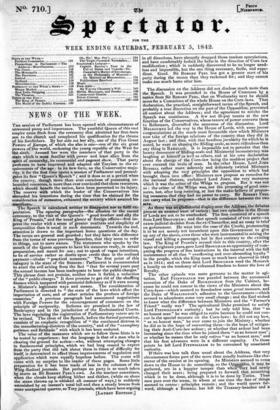NEWS OF THE WEEK.
THE session of Parliament has been opened with circumstances of unwonted pomp and importance. The youthful Queen of this vast empire came fresh from the ceremony that admitted her first-born son to the church and completed his qualification for the throne of his forefathers. By her side sat her ally, one of the Five Great Powers of Europe, of which she also is one—one of the six great powers of the world, reckoning the young republic of the West for the sixth. Around her were the members of that party in the state which is most familiar with power and least alien from the spirit of monarchy, its ceremonial and pageant show. That party professes to have improved and adapted old Tory ism to the re- quirements of the age : in its new form, as the Conservative majo- rity, it for the first time opens a session of Parliament and promul- gates its first "Queen's Speech " ; and it does so at a period when the country, though more than ever conscious of possessing un- bounded resources, is more than ever convinced that those resources, which should benefit the nation, have been perverted to its injury. The reserve with which the leader of the Conservatives has shrouded his intentions during the time that be claimed for the consideration of measures, enhanced the anxiety which awaited his manifesto.
The Speech is calculated neither to disaPpobit inir to fulfil ex- pectation. The opening paragraphs—the allusion to the recent ceremony, to the visit of the Queen's "good brother and ally the King of Prussia," and the usual glance at foreign affairs—first im- press the reader with a sense of greater neatness and simplicity of composition than is usual in such documents. Towards the end, attention is drawn to the important home questions of the day. The terms are general and guarded ; but they have this difference from the terms of some previous Speeches, that they seem to refer to things, not to mere names. The statesman who speaks by the mouth of the Queen appears to have his measures ready, in actual preparation, and meant for use; not to speak of vague intentions, to be of service rather as drafts upon credit than in the realized payment—titular " practical measures." The first point of this category is the state of the finances : Parliament is recommended to avert the evil arising from the fact "that for several years past the annual income has been inadequate to bear the public charges." This phrase does not promise, neither does it forbid, a reduction of the "public charges." It does promise to get rid of the shuffling finance which tampered with perennial deficiency as if it were among a Minister's legitimate ways and means. The consideration of Parliament is directed to "the state of the laws which affect the importation of corn, and of other articles the produce of foreign countries." A previous paragraph had announced negotiations with Foreign Powers for the encouragement of commerce on the principle of reciprocity. Reforms are promised in the law of Bankruptcy and in the jurisdiction of the Ecclesiastical Courts. The laws regulating the registration of Parliamentary voters are to be revised. The close of the Speech, before the formal peroration, consists of an emphatic recognition of "the continued distress in the manufacturing-districts of the country," and of the "exemplary patience and fortitude" with which it has been endured.
The value of the measures which are to follow these hints is to be tested by experience; but the language is that of a man who is clearing the ground for action—who, without attempting changes in fundamental principles, which we had long ceased to expect from the party that did talk about them in times of difficulty for itself, is determined to effect those improvements of regulation and application which were equally hopeless before. The event will come with no surprise to the reader of these pages. Some little preparation for it has been made of late in the columns of the Whig-Radical journals. But perhaps no party is so much taken by storm as Sir Roamer 1'nm:a own. As the mariner sometimes, when the clouds keep shifting hither and thither, (while on shore the straw thrown up is whisked all manner of ways,) is suddenly astonished by an instant's total lull and then a steady breeze from some unexpected quarter, so Tory journals, which have been arguing
in all directions, have abruptly dropped those random speculations, and have comfortably lashed the helm in the direction of Corn .law modification ; which is suddenly discovered to be no longer need- less and impossible, but the one thing necessary, facile, and expe- dient. Good. Sir ROBERT PEEL has got a greater start of -his party during the recess than they reckoned for; and they cannot make too much haste after him.


























